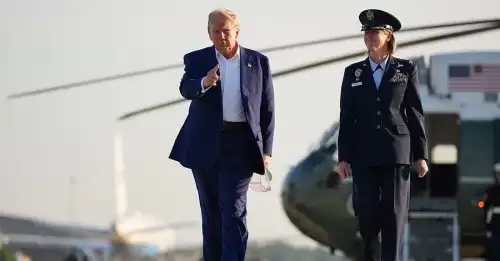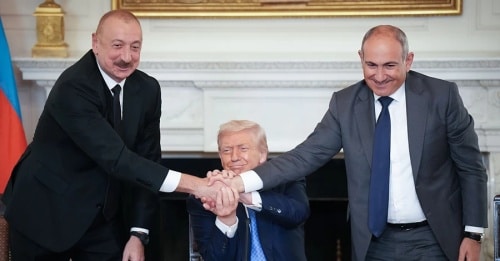“Photo: Andrew Harnick/Getty Images The President of the United States of America, Donald Trump, constantly emphasizes that he single-handedly stopped eight wars, for which he insists on being awarded the Nobel Peace Prize. Indeed, the period of his reign accounts for a certain number of completed armed conflicts in the world. But whether they were stopped precisely thanks to Trump’s efforts – journalist Korotko investigated this issue […]”, — write: businessua.com.ua

Photo: Andrew Harnick/Getty Images
The President of the United States of America, Donald Trump, constantly emphasizes that he has single-handedly stopped eight wars, for which he persistently seeks to be awarded the Nobel Peace Prize. Indeed, the period of his reign accounts for a certain number of completed armed conflicts in the world. But whether they were stopped thanks to Trump’s efforts – the journalist investigated this issue Briefly about.
Not the end of wars, but only an armistice Of all eight wars, about the end of which states Trump himself, only a few have been completed due directly to the efforts of his administration. Like, for example, the long-standing conflict between India and Pakistan. Relations between the two nuclear powers have been strained for years, but hostilities resumed in May after an attack in the Indian-controlled part of Kashmir.
After four days of mutual strikes, Trump tweeted that India and Pakistan had agreed to a “complete and immediate ceasefire”. According to him, this was the result of “long night negotiations with the assistance of the United States.” Pakistan then thanked Trump and later recommended him for the Nobel Peace Prize, citing his “decisive diplomatic intervention”.
India is more reserved about Trump’s impact on ending the conflict. “Ceasefire negotiations were conducted directly between India and Pakistan through existing channels established between the armed forces of both countries,” Indian Foreign Minister Vikram Misri said.
But the important thing here is that only a truce was reached between the two states, and not the end of the war. Neither one nor the other side has given up on harassment of the disputed territories, the root cause of the conflict has not been eliminated.
Peacekeeping blackmail At the same time, Trump’s “peacemaking” often became possible thanks to economic pressure on the parties to the conflict. As it was in the settlement of the long-standing territorial conflict between Thailand and Cambodia. In the midst of another escalation of this conflict, Donald Trump wrote on Truth Social: “I am calling the Acting Prime Minister of Thailand, right now, to also ask for a ceasefire and an END to the war that is currently raging.” A few days after the hostilities on the border, both states did agree to an “immediate and unconditional ceasefire.”
Peace talks have been held in Malaysia, but President Trump has threatened to halt other talks with Thailand and Cambodia to reduce US tariffs if the two countries do not end hostilities. And he knew what to press for – Thailand and Cambodia are largely dependent on exports to the US.
Peace akin to surrender In addition, as in the case of Ukraine, Trump’s “peacemaking” was more like an acknowledgment of the capitulation of one of the parties. For example, as in the case of the long-term conflict between Armenia and Azerbaijan over Nagorno-Karabakh, the end of which Trump likes to mention very much.
In fact, at the time of the beginning of the peace negotiations in this long-term conflict, one of the parties – Armenia – without the support of Russia actually capitulated by itself, completely losing control over Nagorno-Karabakh. And the declaration on peaceful relations between the two states, which Ilham Aliyev and Nikola Pashinyan signed in the presence of Trump in Washington, was more like the signing of the act of surrender of Armenia than a mutual agreement between the two states. However, they both said that Trump should receive the Nobel Peace Prize for his efforts to reach a peace agreement.

Trump in the role of “wedding general” at the signing of the declaration on peaceful relations between the President of Azerbaijan Ilham Aliyev and the President of Armenia Nikolay Pashinyan. Photo: Andrew Harnik/Getty Images
Peacemaking with a flavor of looting The distinguishing feature of Trump’s peace efforts has almost always been his financial gain. “Bringing” the so-called peace, he often took an exorbitant price for it from the states that were destroyed by the war. As, by the way, there was an attempt in the notorious “peace plan” of 28 points to deprive Ukraine of hundreds of billions of dollars, which are provided for its restoration, in exchange for peace. Fortunately, this point disappeared in a few days.
The same practice, in fact, of racketeering, he already experienced during the resolution of the ethnic conflict between the Democratic Republic of Congo and Rwanda – between the Tutsi and Hutu tribes. For the termination of this conflict, the United States, in the person of Donald Trump, received the right to develop minerals in the Congo.
In addition, even after the agreement was signed, both sides accused each other of violating the truce, and the rebels, whom Great Britain and the United States associate with Rwanda, threatened to withdraw from the peace talks. “The fighting between Congo and Rwanda continues, which is why the truce never came into force,” says Margaret Macmillan, professor of history at Oxford University. Therefore, this conflict still cannot be considered stopped.
Ending wars that never happened In addition, Donald Trump credits himself with ending wars that did not actually happen. As, for example, in the case of a conflict situation between Serbia and Kosovo. These two states have been in a state of conflict for a long time – a legacy of the Balkan wars of the 1990s, due to which tension periodically arose between them.
On June 27 of this year, Donald Trump declared that he prevented the start of hostilities between these states: “Serbia and Kosovo were going to enter into a conflict, it could turn into a big war. I said: come into conflict – no trade with the United States. They replied: “Well, maybe we won’t go for it.”
But even this peacemaking of Trump is more like a farce. “Serbia and Kosovo didn’t fight or fire at each other, so it’s not a war that needed to be stopped,” says Oxford University history professor Margaret McMillan.
The same “fake war” that Trump allegedly stopped involved Egypt and Ethiopia. As such, there was no such “war” that Trump could stop, but there have long been tense relations between the states due to the dam on the Nile.
Construction of the Grand Ethiopian Renaissance Dam was completed in Ethiopia this summer, and Egypt said it could affect the amount of water it takes from the Nile. On June 29, after 12 years of disagreements, Egypt’s foreign minister announced that negotiations with Ethiopia had reached an impasse. Afterwards, Trump said: “If I were Egypt, I would like to get water from Nile”. He promised that the USA would solve this issue very quickly.
Egypt welcomed Trump’s words, but Ethiopian officials said the announcement would only increase tensions. And although an official agreement on the settlement of differences between Egypt and Ethiopia was never reached, Trump himself brazenly declared that he had saved these states from war, and was offended that the Nobel Peace Prize was awarded to another.
Peacekeeping with cruise missiles There was a hot ground war, with no end in sight, between Israel and Iran, the reconciliation between which was announced by Trump himself. Just on June 13, Israel struck targets in Iran. The US also struck Iranian nuclear facilities.
Afterward, Trump wrote on Truth Social: “Iran will officially begin a cease-fire, and in 12 hours Israel will also begin a cease-fire, and in 24 hours the world will welcome the official end of the 12-day war.”
After the fighting ended, Iran’s Supreme Leader Ayatollah Ali Khamenei said his country had won a “decisive victory” and made no mention of the ceasefire. And Israel made it clear that it could strike Iran again in response to new threats.
“There is no agreement on permanent peace or how to control Iran’s nuclear program in the future,” said Michael O’Hanlon, a senior fellow at the Brookings Institution think tank. “Thus, in fact, we have a ceasefire rather than an end to the war.”
In addition, Trump considers stopping the war between Israel and the Hamas group to be his eighth victory. Although here, too, it is only about the suspension of hostilities, and not about a complete ceasefire. In fact, the main positive point of this temporary truce can only be called the release of all Israeli hostages who have been held captive by Hamas for more than two years.
Source: kp.ua
Please wait…
